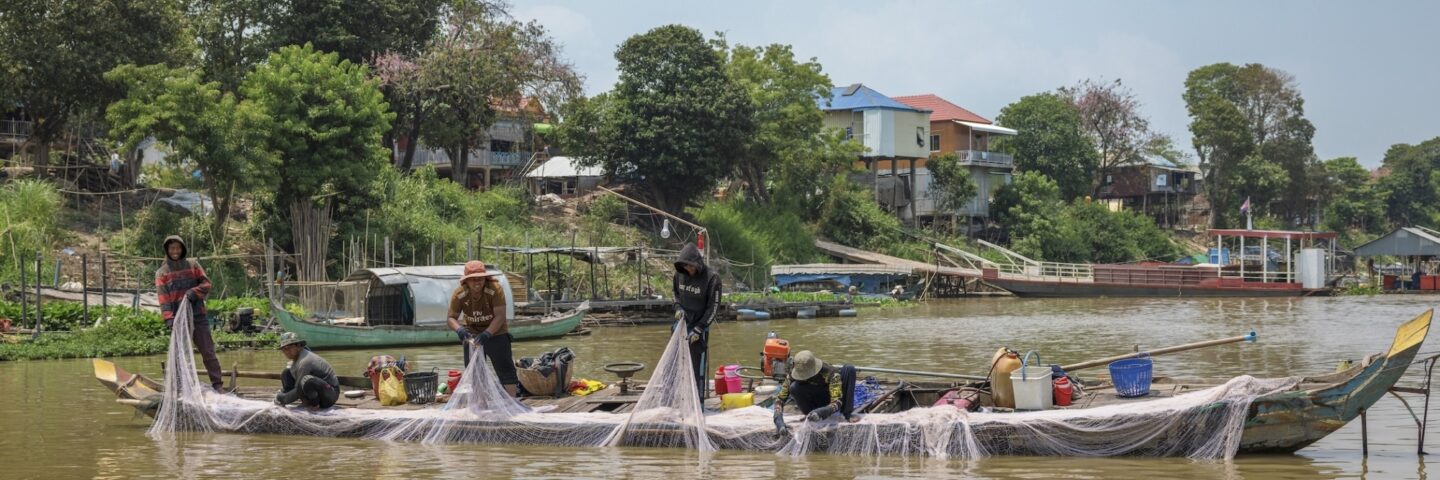
Generating Resilient Environments and Promoting Socio-Economic Development of the East Tonle Sap Lake (GREEN)
Timeline: March 2021 – May 2025 | Budget: USD $2 million | Country: Cambodia
In May 2025, iDE Cambodia successfully concluded its implementation of the 4-year Generating Resilient Environments and Promoting Socio-Economic Development of the East Tonle Sap Lake (GREEN) project. Located in Tonle Sap Lake-provinces of Pursat, Kampong Chhang, and Kampong Thom, the aim of the GREEN project was to improve the socioeconomic status and climate resilience of vulnerable fishing communities in the region.
What Did The Project Do?
The GREEN project focused on three thematic areas: water, sanitation, and hygiene (WASH); green economies; and education. Save the Children led the project consortium and education implementation and Voluntary Services Overseas (VSo) led the green economies implementation. iDE Cambodia led the WASH component, which included clean drinking water, sanitation, hygiene, and solid waste management (SWM) in partnership with Wetlands Work, Hydrologic Social Enterprise, and TapEffect. iDE’s sanitation activities were an iteration of methods developed during iDE’s long standing sanitation market development work in rural Cambodia, under the Sanitation Market Scale-Up (SMSU) program.
Utilizing a market-based approach, iDE increased equitable access to and use of sanitation services in the east Tonle Sap Lake area. iDE Cambodia’s approach was based on the following pillars:
Human Centered Design: Sanitation products designed and tailored to local contexts, user needs and preferences.
Strengthening Sanitation Entrepreneurs: Local sanitation businesses supported to deliver climate-resilient sanitation technologies, solutions and services.
Demand Generation and Social Behavior Change: Sales agents trained to conduct door to door sales presentations to generate demand and enable long-term behavior change.
Local Authority Capacity Building: Local authorities closely supported to identify households without sanitation and strengthen their sanitation promotion skills to local communities and connect them to sanitation entrepreneurs.
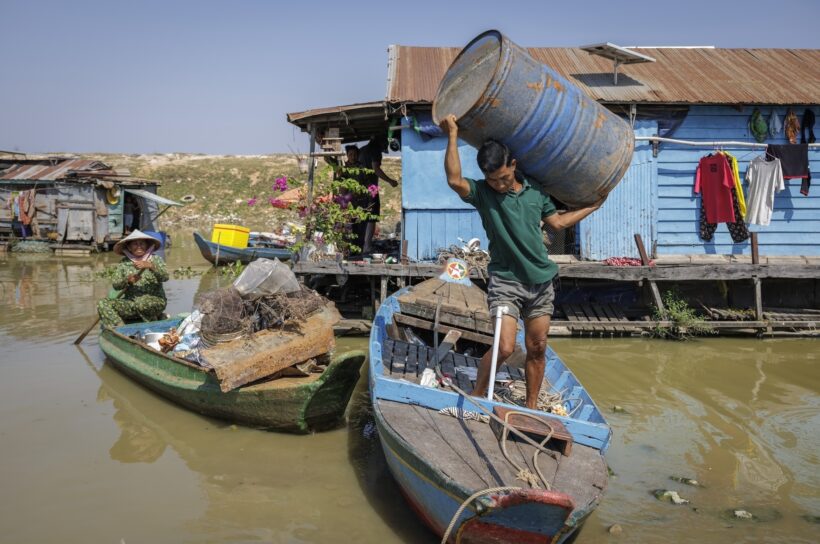
The GREEN project supported 17 local entrepreneurs in the sanitation, clean water, and solid waste sectors to graduate from the six-month SHE business incubator. Photo by Simon Toffanello for iDE Cambodia.
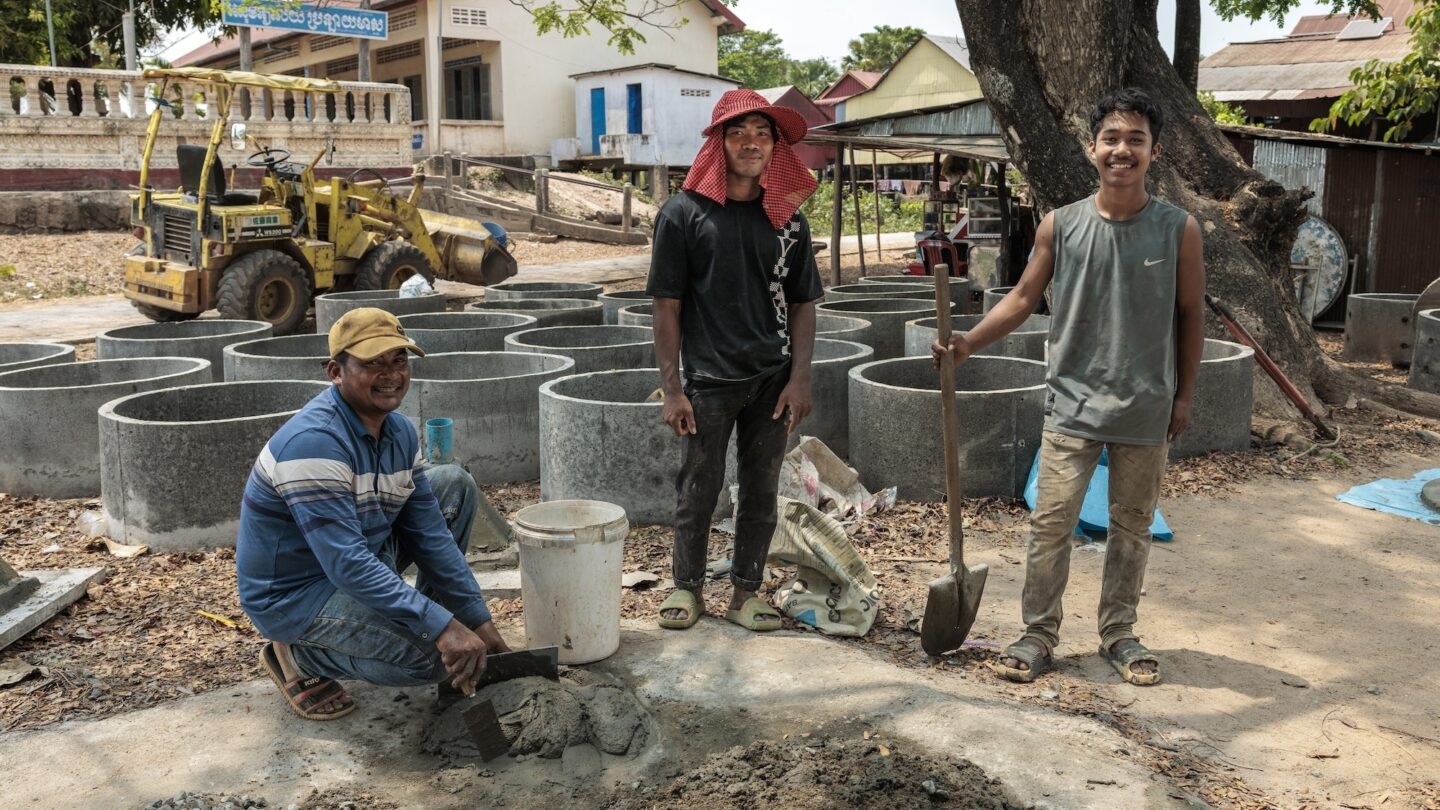
Mr. Muth Kosal, a sanitation entrepreneur [left] and his team manufacture components of the Sky Latrine for households in climate vulnerable areas of rural Cambodia. Photo by Simon Toffanello for iDE Cambodia
Resilience-Enhancing Sanitation Products
Rural households in sanitation-challenging environments face multiple challenges, from seasonal flooding and high groundwater to dense, low-infiltration soils. These conditions often cause pour-flush latrines to fill quickly or fail, increasing the risk of unsafe fecal sludge management (FSM) and environmental contamination. Effective, durable, and resilient sanitation solutions are often not available or affordable to typical households in the remote areas around the Tonle Sap lake.
iDE applies a human-centered design (HCD) approach to develop climate-resilient, context-specific solutions. Products are developed with community input through interviews, prototyping, and field testing and continuously improved and iterated on based on user feedback. All products are built with locally available materials and prioritize affordability, durability, quality, and year-round functionality. During the GREEN project, iDE connected sanitation entrepreneurs sold, manufactured, delivered and installed the Easy Latrine, Elevated Easy Latrine, Sky Latrine and HandyPod.
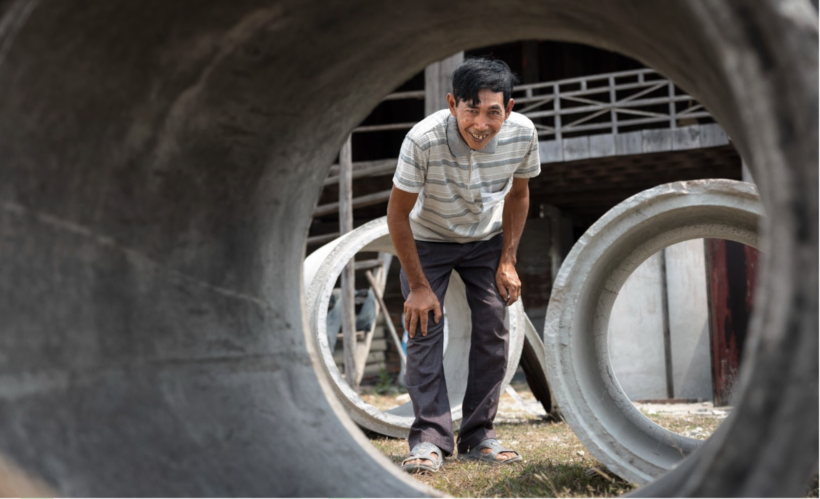
Mr. Kam Tes, local sanitation entrepreneur from Kampong Chnnang Province, Cambodia. Photo by Simon Toffanello for iDE Cambodia.
Strengthening Sustainable Sanitation and Solid Waste Management Markets
At the core of GREEN was a commitment to build resilient, inclusive rural sanitation and SWM economies driven by local entrepreneurs. iDE supported sanitation businesses to earn $314,963 in net revenue while regularly coaching and mentoring them on technical, financial, and marketing business skills. iDE’s SHE incubator program successfully enhanced the entrepreneurial capacities of sanitation entrepreneurs, clean drinking water business owners and informal waste collectors through a six-month business training program (January to July 2023), resulting in improvements in financial literacy, business management, leadership and sustainable practices. iDE engaged one general waste collector in Boribo District, Kampong Chhnang, and supported the enterprise with training on effective route planning, financial tracking and customer engagement, among other core competencies needed for business expansion
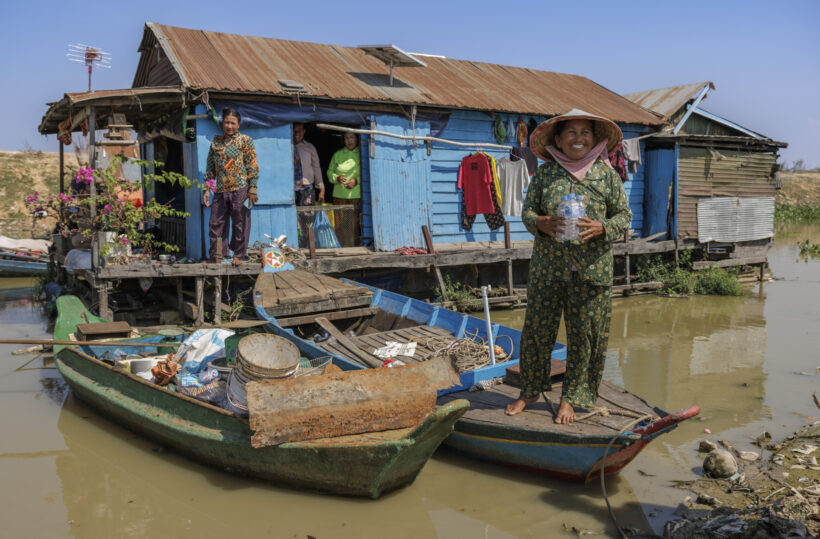
iDE Cambodia is working to develop innovative solutions to solid waste management. Photo by Simon Toffanello for iDE Cambodia.
Generating Demand through Sales, Marketing and Behavior Change
Powered by a trained network of local sales agents, iDE connects with households and offers desirable sanitation solutions. Using visual “sight sellers,” sales agents promote iDE’s WASH products as well as healthy sanitation behaviors. Through solution-oriented messaging, sales agents strive to understand the challenges facing their potential customers and tailor their presentations based on context-specific challenges or issues like flooding. During GREEN, iDE’s sales agents conducted 26,842 household sales presentations. Research was conducted to effectively offer climate-targeted subsidies, and throughout the project, 2,170 IDPoor (identified as “in poverty” by the Cambodian government based on multidimensional poverty indices) and climate-vulnerable households received subsidies to purchase sanitation products at a 40% discounted price. Subsidy eligibility considered both income and climate vulnerability to ensure deeper equity.
To support iDE’s demand generation efforts, iDE designed and implemented a comprehensive social behavior change communication (BCC) campaign, “Let’s Clean Up the Tonle Sap” (LCUTSL), to promote improved practices across four themes: safe sanitation, clean drinking water, hand hygiene, and solid waste management. The campaign integrated digital and ground-based strategies, developed through extensive stakeholder consultations and iterative testing.
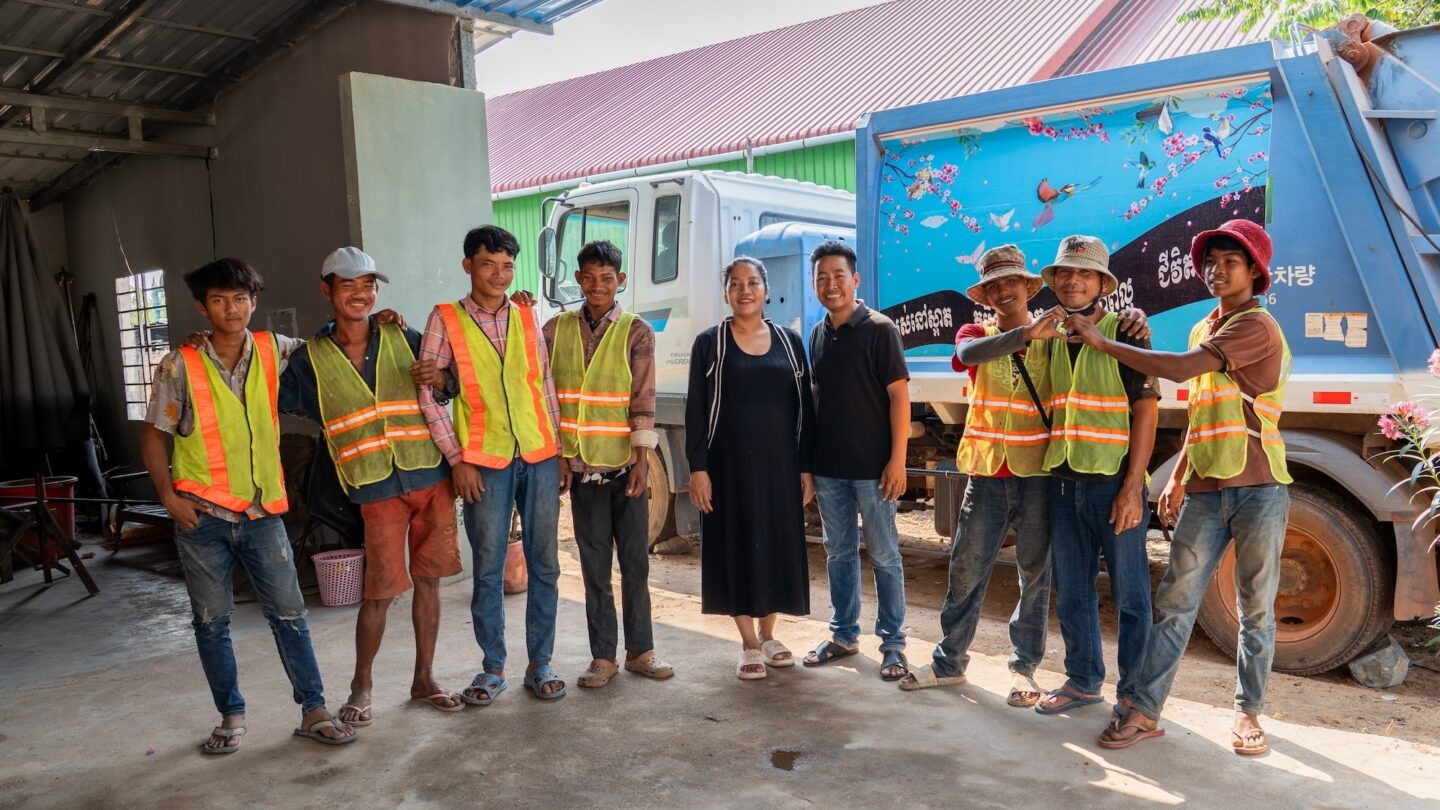
Mr. Lam Samnang, solid waste management service provider in Boribo District, Kampong Chhnang province has expanded his business from less than 400 to over 2000 households and businesses. Photo by Jason Kret for iDE Cambodia
What’s next?
While GREEN laid the foundation for a more climate-resilient, inclusive, rural sanitation and SWM market system in Cambodia, the work is not finished. From 2025 onwards, iDE Cambodia’s WASH program will continue to facilitate access to climate-resilient sanitation for the remaining households without basic latrines and scale up affordable safely managed sanitation products and services to rural Cambodian households. SWM activities in Kampong Chhnang will continue throughout 2025 through the Waste Management Market Acceleration (WaMA) Project.
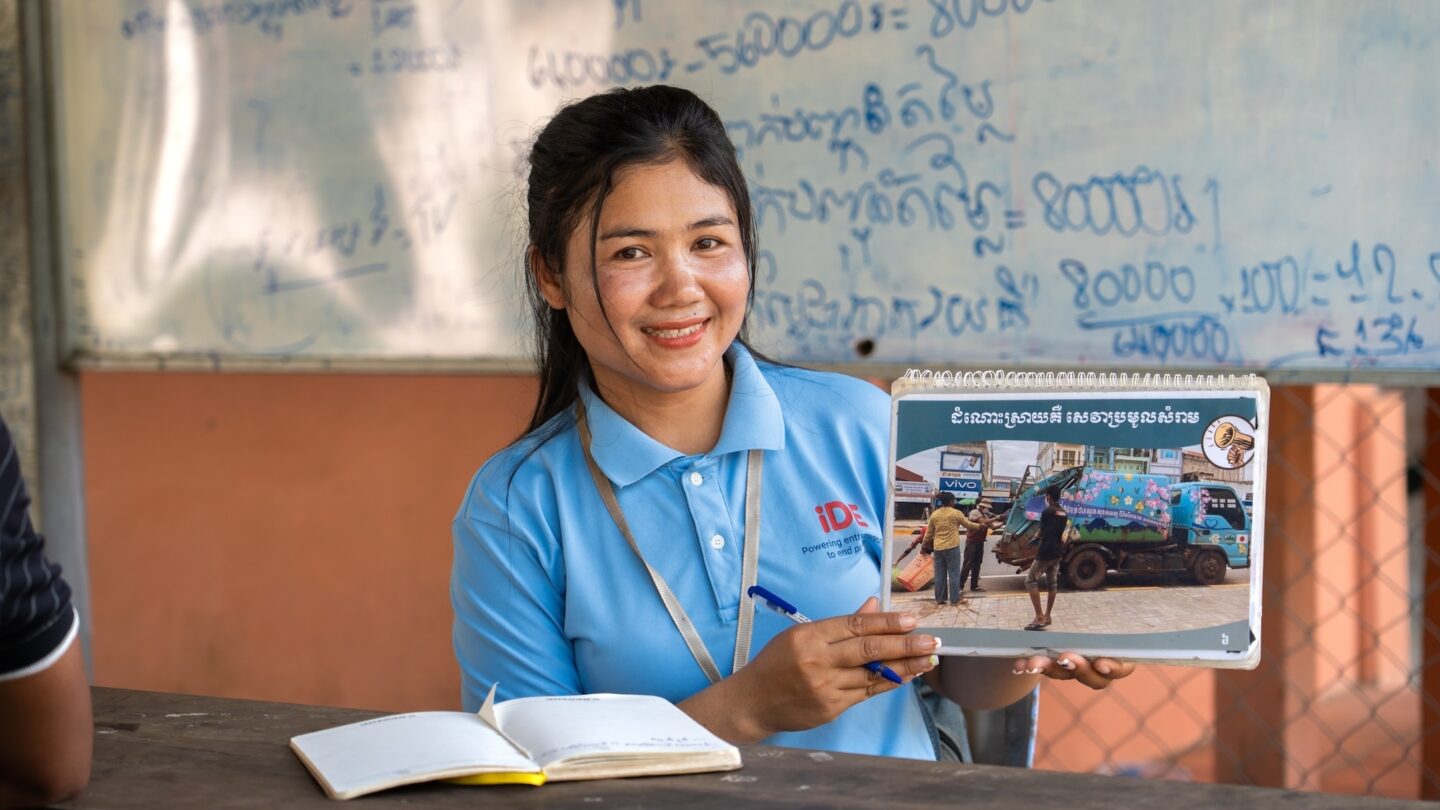
Ms. Chhaya Nhor, an iDE sales agent based in Boribo District, Cambodia, conducting a sales presentation promoting iDE's waste collection service, filling a critical gap in solid waste management in rural communities, where the majority of households lack access to formal collection services and often resort to unsafe practices like burning, burying, or open dumping. Photo by Jason Kret for iDE Cambodia.
Download GREEN’s Key Resources:
GREEN In The Press:
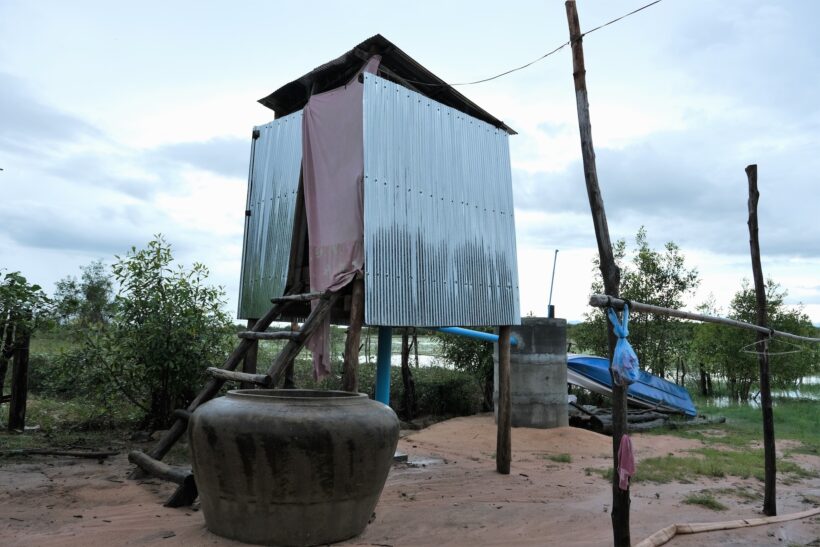
Sky Latine in Kampong Preah Village in Cambodia. Photo by Tyler Kozole for iDE Cambodia.

Read More
